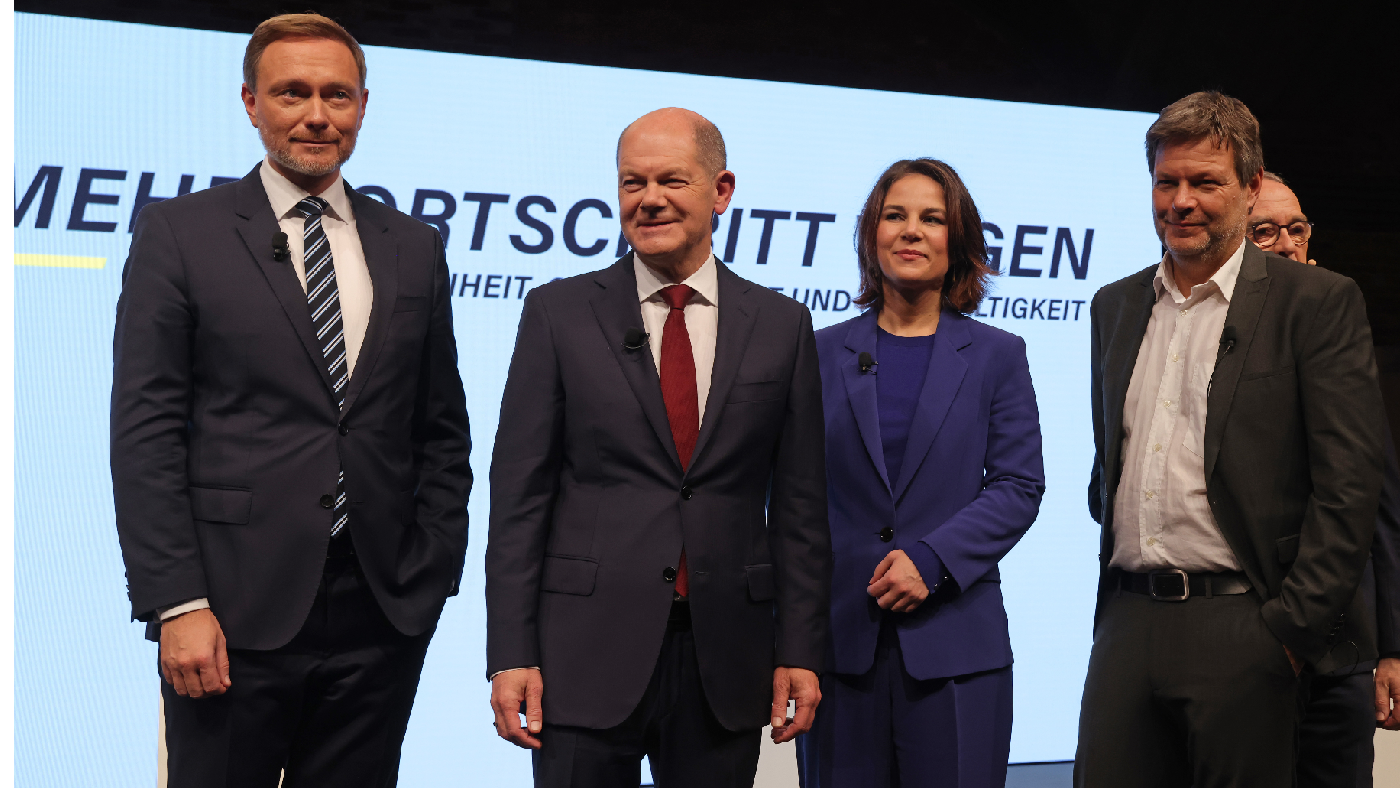The traffic-light coalition: a new start for Germany?
New government expected to be sworn in next week, signalling end of Angela Merkel’s 16-year rule

A free daily email with the biggest news stories of the day – and the best features from TheWeek.com
You are now subscribed
Your newsletter sign-up was successful
The “traffic-light” coalition is a go-go, said Marcel Fürstenau in Deutsche Welle (Bonn). After two months of intense negotiations following September’s German federal elections, a groundbreaking deal has been struck to form the country’s next government.
The victorious centre-left SPD (red) will provide the next chancellor, Olaf Scholz. It will share power with the Greens (whose co-leader, Annalena Baerbock, is to be foreign minister) and the yellow-flagged, free-market FDP, whose leader Christian Lindner will serve as finance minister.
The 177-page coalition deal, unveiled in Berlin last week, must be signed off by party members, but the new government is expected to be sworn in next week, signalling the end of Angela Merkel’s 16-year conservative rule. And though it faces a daunting in-tray – not least soaring Covid rates – there’s plenty of reason for cheer. The parties have shown an admirable willingness to compromise, and the result is “an ambitious programme for Germany, Europe and the world”.
The Week
Escape your echo chamber. Get the facts behind the news, plus analysis from multiple perspectives.

Sign up for The Week's Free Newsletters
From our morning news briefing to a weekly Good News Newsletter, get the best of The Week delivered directly to your inbox.
From our morning news briefing to a weekly Good News Newsletter, get the best of The Week delivered directly to your inbox.
The parties seem to have found plenty of common ground, said Frankfurter Allgemeine Zeitung. Among a raft of legislative proposals in the agreement are plans to liberalise Germany’s archaic citizenship laws, raise the hourly minimum wage to s12, and even legalise cannabis. The new government will also shrink the size of the German parliament, expand gay and trans rights, and give 16-year-olds the vote.
But the coalition’s “central concern” is the environment, said Lennart Pfahler in Die Welt (Berlin). The word “climate” appears 198 times in the agreement (54 times more than the word “Germany”); and the deal includes pledges to phase out coal by 2030 instead of 2038, and expand renewable energies to cover 80% of Germany’s needs by 2030 (up from 45% today). There’ll even be a new economy and climate “super ministry”, probably run by the Greens.
Don’t expect it all to be plain sailing, said The Economist. On fiscal policy, in particular, the parties “bickered” during coalition talks; and the FDP’s thrifty instincts mean the Greens will struggle to meet their s50bn annual spending plans for a green transition. And though there was consensus on the need for a tough stance on China, talks on Russia were so fraught that the coalition agreement ducks any explicit mention of the controversial Nord Stream 2 pipeline, which is due to supply Russian gas to Europe.
What’s more, the government is coming to power as Germany faces an escalating Covid crisis. Cases in the country are at their highest-ever levels; thousands of people are dying from the virus each week; and calls for a new national lockdown are growing.
A free daily email with the biggest news stories of the day – and the best features from TheWeek.com
Nevertheless, I feel oddly optimistic, said Katharina Schuler in Die Zeit (Hamburg). If the new government can get through the next few months, it might just make Germany a “more modern, more sustainable” and fairer place over the course of the next four years.
-
 The environmental cost of GLP-1s
The environmental cost of GLP-1sThe explainer Producing the drugs is a dirty process
-
 Greenland’s capital becomes ground zero for the country’s diplomatic straits
Greenland’s capital becomes ground zero for the country’s diplomatic straitsIN THE SPOTLIGHT A flurry of new consular activity in Nuuk shows how important Greenland has become to Europeans’ anxiety about American imperialism
-
 ‘This is something that happens all too often’
‘This is something that happens all too often’Instant Opinion Opinion, comment and editorials of the day
-
 The fall of the generals: China’s military purge
The fall of the generals: China’s military purgeIn the Spotlight Xi Jinping’s extraordinary removal of senior general proves that no-one is safe from anti-corruption drive that has investigated millions
-
 Epstein files topple law CEO, roil UK government
Epstein files topple law CEO, roil UK governmentSpeed Read Peter Mandelson, Britain’s former ambassador to the US, is caught up in the scandal
-
 Iran and US prepare to meet after skirmishes
Iran and US prepare to meet after skirmishesSpeed Read The incident comes amid heightened tensions in the Middle East
-
 Syria’s Kurds: abandoned by their US ally
Syria’s Kurds: abandoned by their US allyTalking Point Ahmed al-Sharaa’s lightning offensive against Syrian Kurdistan belies his promise to respect the country’s ethnic minorities
-
 Israel retrieves final hostage’s body from Gaza
Israel retrieves final hostage’s body from GazaSpeed Read The 24-year-old police officer was killed during the initial Hamas attack
-
 China’s Xi targets top general in growing purge
China’s Xi targets top general in growing purgeSpeed Read Zhang Youxia is being investigated over ‘grave violations’ of the law
-
 Panama and Canada are negotiating over a crucial copper mine
Panama and Canada are negotiating over a crucial copper mineIn the Spotlight Panama is set to make a final decision on the mine this summer
-
 Iran unleashes carnage on its own people
Iran unleashes carnage on its own peopleFeature Demonstrations began in late December as an economic protest